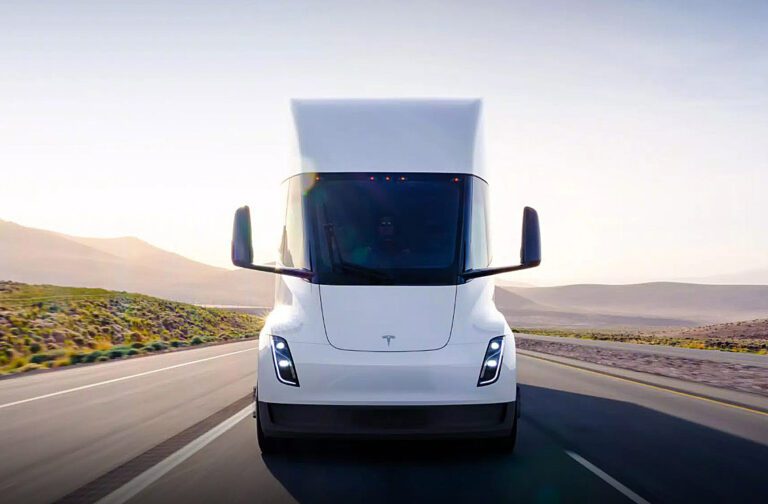DETROIT — The head of the National Transportation Safety Board (NTSB) is expressing concern about the safety risks that heavy electric vehicles pose if they collide with lighter vehicles.
Consider this:
A diesel semi tractor’s unladed weight can range from 10,000 to 25,000 pounds, depending on how powerful the engine is and its towing design, and if it’s a sleeper cab.
An electric Tesla Semi is estimated to weigh at least 27,000 pounds, although the company has yet to confirm it. The estimate is based on a recent Tweet by Tesla founder Elon Musk, who bragged about the Semi hauling a 53-foot flatbed loaded with jersey barriers for 500 miles on a single charge.
“Our best clue to date for the weight of the 500 mile Tesla Semi. The load, 11 jersey barriers at 4K lbs each, is ~44K lbs. A 53 ft flatbed weighs about 10K lbs empty. Assuming this was the 500 mile test, total weight was 81K lbs so tractor is 27k lbs, 2000 lbs lighter than Tre,” a recent tweet from Nikola Insider read.
Nikola is another electric truck manufacturer. Their Tre Bev Class 8 tractor — a cabover design — weighs in at 29,800 pounds on its own.
NTSB head Jennifer Homendy raised the issue in a speech in Washington to the Transportation Research Board. She noted, by way of example, that an electric GMC Hummer weighs about 9,000 pounds, with a battery pack that alone is 2,900 pounds — roughly the entire weight of a typical Honda Civic.
“I’m concerned about the increased risk of severe injury and death for all road users from heavier curb weights and increasing size, power, and performance of vehicles on our roads, including electric vehicles,” Homendy said in remarks prepared for the group.
The extra weight that EVs typically carry stems from the outsize mass of their batteries. To achieve 300 or more miles of range per charge from an EV, batteries have to weigh thousands of pounds.
Some battery chemistries being developed have the potential to pack more energy into less mass. But for now, there’s a mismatch in weight between EVs and smaller internal combustion vehicles. EVs also deliver instant power to their wheels, making them accelerate faster in most cases than most gas-powered cars, trucks and SUVs.
Homendy said she was encouraged by the Biden administration’s plans to phase out carbon emissions from vehicles to deal with the climate crisis. But she said she still worries about safety risks resulting from a proliferation of EVs on roads and highways.
“We have to be careful that we aren’t also creating unintended consequences: More death on our roads,” she said. “Safety, especially when it comes to new transportation policies and new technologies, cannot be overlooked.”
Homendy noted that Ford’s F-150 Lightning EV pickup is 2,000 to 3,000 pounds heavier than the same model’s combustion version. The Mustang Mach E electric SUV and the Volvo XC40 EV, she said, are roughly 33% heavier than their gasoline counterparts.
“That has a significant impact on safety for all road users,” Homendy added.
The NTSB investigates transportation crashes but has no authority to make regulations. For vehicles, such authority rests largely with the National Highway Traffic Safety Administration.
Even apart from EVs, the nation’s roads are crowded with heavy vehicles, thanks to a decadelong boom in sales of larger cars, trucks and SUVs that’s led to extreme mismatches in collisions with smaller vehicles. But electric vehicles are typically much heavier than even the largest trucks and SUVs that are powered by gasoline or diesel.
Michael Brooks, executive director of the nonprofit Center for Auto Safety, said he, too, is concerned about the weight of EVs because buyers seem to be demanding a range of 300 or more miles per charge, requiring heavy batteries.
Setting up a charging network to accommodate that may be a mistake from a safety perspective, Brooks said.
“These bigger, heavier batteries are going to cause more damage,” he said. “It’s a simple matter of mass and speed.”
Brooks said he knows of little research done on the safety risks of increasing vehicle weights. In 2011, the National Bureau of Economic Research published a paper that said being hit by a vehicle with an added 1,000 pounds increases by 47% the probability of being killed in a crash.
He points out that electric vehicles have very high horsepower ratings, allowing them to accelerate quickly even in crowded urban areas. “People are not trained to handle that type of acceleration. It’s just not something that drivers are used to doing,” Brooks said.
Also, many newer electric SUVs are tall with limited visibility that poses risks to pedestrians or drivers of smaller vehicles, he said.
Sales of new electric vehicles in the U.S. rose nearly 65% last year to 807,000 — about 5.8% of all new vehicle sales. The Biden administration has set a goal of having EVs reach 50% of new vehicle sales by 2030 and is offering tax credits of up to $7,500 to get there. The consulting firm LMC Automotive has made a more modest prediction: It expects EVs to make up one-third of the new-vehicle market by 2030.
The Trucker Staff contributed to this report.
The Associated Press is an independent global news organization dedicated to factual reporting. Founded in 1846, AP today remains the most trusted source of fast, accurate, unbiased news in all formats and the essential provider of the technology and services vital to the news business. The Trucker Media Group is subscriber of The Associated Press has been granted the license to use this content on TheTrucker.com and The Trucker newspaper in accordance with its Content License Agreement with The Associated Press.











if you get hit with 80.000 pounds ! whats a couple thousand more ? 80.000
The math shows that the writer did not finish high school, Does Brandon know that you are against ev’s either little car or big truck ?